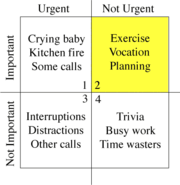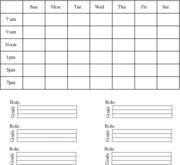First Things First
First Things First[1] (1994) is a self-help book written by Stephen Covey and A. Roger and Rebecca R. Merrill. It offers a time management approach that, if established as a habit, is supposed to help a person achieve "effectiveness" by aligning him- or herself to "First Things". The approach is a further development of the approach popularized in Covey's The Seven Habits of Highly Effective People and other titles.
The book asserts that there are three generations of time management: first-generation task lists, second-generation personal organizers with deadlines and third-generation values clarification as incorporated in the Franklin Planner. Using the analogy of "the clock and the compass," the authors assert that identifying primary roles and principles provides a "true north" and reference when deciding what activities are most important, so that decisions are guided not merely by the "clock" of scheduling but by the "compass" of purpose and values. Asserting that people have a need to "to live, to love, to learn, and to leave a legacy" they propose moving beyond "urgency addiction" into what they call "quadrant two" management (not the same as the quadrant II in a Cartesian coordinate system).
In the book, Covey describes a framework for prioritizing work that is aimed at long-term goals, at the expense of tasks that appear to be urgent, but are in fact less important. This is his 2x2 matrix: classifying tasks as urgent and non-urgent on one axis, and important or non-important on the other axis. His quadrant 2 has the items that are non-urgent but important. These are the ones he believes we are likely to neglect; but, should focus on to achieve effectiveness.
Important items are identified by focusing on a few key priorities and roles which will vary from person to person, then identifying small goals for each role each week, in order to maintain a holistic life balance. One tool for this is a worksheet that lists up to seven key roles, with three weekly goals per role, to be evaluated and scheduled into each week before other appointments occupy all available time with things that seem urgent but are not important. This concept is illustrated with a story that encourages people to "place the big rocks first."
Delegation is presented as an important part of time management. Successful delegation, according to Covey, focuses on results and benchmarks that are to be agreed in advance, rather than on prescribing detailed work plans.
http://en.wikipedia.org/wiki/First_Things_First_(book)
First Things First. To Live. To Love. To Learn. To Leave a Legacy. Sounds like a terrific plan for a rewarding and balanced life. Stephen R. Covey, A. Roger Merrill, and Rebecca R. Merrill have created one of the best books I've read to help us all balance the spiritual, mental, physical, and social elements of our lives.
The book is in four sections:
Section One: The Clock and the Compass
Here the authors discuss time management problems we face in our personal and business lives.
Our struggle to put first thing first can be characterized by the contrast between two powerful tools that direct us: the clock and the compass. The clock represents our commitments, appointments, schedules, goals, activities—what we do with, and how we manage our time. The compass represents our vision, values, principals, mission, conscious, direction—what we feel is important and how we lead our lives.
[page 19]
The section talks about the strengths and weaknesses of various time management strategies.
Some of the main concepts discussed in the section are balancing spiritual, mental, social, and physical needs. Balance is achieved by using personal endowments such as self-awareness, conscience, independent will, and creative imagination to align to "True North" principles (the compass). Various exercises are provided to help you explore these aspects for yourself.
Th first section introduces the following Urgency / Importance quadrant that is used throughout the book as a way of looking at time priorities.
I Urgent - Important
| II Not Urgent - Important
|
III Urgent - Not Important
| IV Not Urgent - Not Important
|
Section Two: The Main Thing Is To Keep The Main Thing The Main Thing
This section introduces Quadrant II Organizing: The Process of Putting First Things First. The key here is identifying what our first things are in relation to our life roles. There is a lot in this section, but perhaps the following discussion of roles provides a good sample:
Our Natural Roles Grow Out of Our Mission
Where do we get our roles? If we haven't paid the price to work them out in our deep inner life, they're probably a combination of feelings we have about ourselves and the social mirror.
But if we have paid the price, our roles are like the branches of a living tree. They grow naturally out of a common trunk—our mission, the unique fulfillment of our needs and capacities—and common roots—the principals that give sustenance and life. Our roles become the channels through which we live, love, learn, and leave a legacy.
[pages 124-5]
Again, the section is filled with discussions and exercises to help you identify your mission, principles, and roles.
Section Three: The Synergy Of Interdependence
This section explores personal missions in the context of other people. This involves developing shared visions with in organizations and developing win-win relationships in personal, professional, and business life.
The Miracle of the Chinese Bamboo Tree
The Chinese bamboo tree is planted after the earth is prepared, and for the first four years, all the growth is underground. The only thing visible above the ground is a little bulb and a small shoot coming out of it.
Then, in the fifth year, the bamboo tree grows up to eighty feet.
Principal-centered leaders understand the metaphor of the bamboo tree. They understand the value of working in Quadrant II. They know what it means to pay the price to prepare the ground, to plant the seed, and to fertilize and cultivate and water and weed, even when they can't see immediate results, because they have faith that ultimately they will reap the fruits of the harvest.
And what wonderful fruits they are!
Your organization's culture is the one competitive advantage that cannot be duplicated. Technology can be copied. Information can be acquired. Capital can be bought. But the ability of your organization to collaborate effectively, to work in Quadrant II, to put first things first, cannot be bought, transferred, or installed. A high-trust, empowered culture is always home grown.
The same is true for a family, or any other group of people. A quality culture must be nourished over time. Only by acting in harmony with correct principles, exercising patience, humility, and courage, and working within your Circle of Influence can you transform yourself and positively influence your organization. You can only create empowerment from the inside out.
[Pages 265-6]
Section Four: The Power and Peace of Principle-Centered Living
The final section talks about moving from time management to personal leadership and leaves us with the following question:
Is there something I feel I could do to make a difference?
Think about it. It may require a letting go—of illusory paradigms, rationalizing, wants, urgency addiction . . . even your comfort zone. But deep down, in all honesty of heart, do you feel there's something you could do, some contribution you could make, some legacy you could leave that would impact your family, your work team, your organization, your community, your society in a positive way?
If there is, we encourage you to act on it. As Ghandi dais, "We must become the change we seek in the World." Whatever you are in terms of becoming principle-centered, we encourage you to start exercising the attributes of your heart. Make a promise and keep it. Set a goal and achieve it. There is peace in it. As Emerson said:
Nothing can bring you peace but yourself. Nothing can bring you peace but the triumph of principles.
http://www.shared-visions.com/explore/literature/firstthings.htm


No comments:
Post a Comment